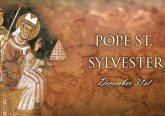May 12: St. Epiphanius of Salamis
On May 12 the Catholic Church honors Saint Epiphanius of Salamis, an early monk, bishop and Church Father known for his extensive learning and defense of Catholic teachings in the fourth century.
During a 2007 visit with the Orthodox Archbishop of Cyprus, Pope Benedict XVI praised Epiphanius as “a good pastor” who “pointed out to the flock entrusted to him by Christ, the truth in which to believe, the way to take and the pitfalls to avoid.”
“At the beginning of this third millennium,” the Pope reflected during the visit, “the Church finds herself facing challenges and problems not at all unlike those which Bishop Epiphanius had to tackle.”
Epiphanius was born in Palestine around 310 or 315, the son of Greek-speaking Jewish parents. He is said to have been drawn to the Church after seeing a monk give away his clothing to a person in need. Not long after his conversion, he became a monk himself, spending time in the Egyptian deserts.
Around 333 he returned to the Holy Land and built a monastery near his birthplace in Judea. Epiphanius showed great dedication to the rigors of monasticism, which some of his contemporaries considered excessive, although he insisted he was only seeking to work faithfully for God’s kingdom.
The devoted monk was also a man of extraordinary learning, versed in the Hebrew, Egyptian, Syrian, Greek, and Latin languages and literature. For over two decades, until 356, Epiphanius was a disciple and close companion of Saint Hilarion the Great, a monk known for his wisdom and miracles.
The spiritual bond between them remained unbroken after Hilarion left Palestine around 356. Hilarion’s influence within the Church of Salamis, in present-day Cyprus, led to its choice of Epiphanius as bishop in 367.
During his years in Palestine, Epiphanius had frequently offered guidance and help in the Church’s struggle against Arianism, the heresy which denied Jesus’ eternal existence as God. As a bishop, he went on to write several works arguing for orthodox teaching on subjects like the Trinity and the Resurrection.
Determined to protect the Church from error, Epiphanius became involved in various controversies and was known as a strong voice for orthodoxy. In some instances, however, his zeal was misguided or uninformed, as when he inadvertently became involved in a plot against Saint John Chrysostom.
Likewise, some of Epiphanius’ apologetic works are regarded today as inaccurate or flawed on certain points. Nonetheless, he is revered among the early Church Fathers, and his writings – which contain important formulations of orthodox belief – are cited in the Catechism of the Catholic Church.
St. Epiphanius of Salamis died in 403, while returning from Constantinople after distancing himself from the attempt to depose St. John Chrysostom. Sensing the approach of death, he gave his disciples two final pieces of advice: to keep God’s commandments, and guard their thoughts against temptation.
He was buried on May 12, after his ship’s return to Salamis. The Seventh Ecumenical Council, in 787, confirmed his reputation as a Church Father worthy of veneration.













